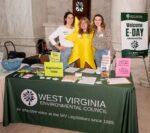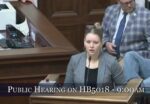- Share on Facebook
- Like
- Tweet
- Digg
- Del
- Tumblr
- VKontakte
- Buffer
- Love This
- Odnoklassniki
- Meneame
- Blogger
- Amazon
- Yahoo Mail
- Gmail
- AOL
- Newsvine
- HackerNews
- Evernote
- MySpace
- Mail.ru
- Viadeo
- Line
- Comments
- Yummly
- SMS
- Viber
- Telegram
- Subscribe
- Skype
- Facebook Messenger
- Kakao
- LiveJournal
- Yammer
- Edgar
- Fintel
- Mix
- Instapaper
- Copy Link
And the Hits Just Keep on Comin’, and yet we FIGHT!
What an incredible week it has been! The week’s not over, but WVEC staff, board, and supporters have covered a lot of ground.
Thank you to everyone who showed up and spoke out at the Public Hearing on HB 2506 on Monday and made the rounds with us on E-Day at the Capitol.
With over 60 supporters in attendance, we were able to attend ten face-to-face meetings with our WV House and Senate elected officials and distributed clean water legislative reminder packages to each of our 34 WV Senators and 100 WV Delegates. We made our voices heard throughout the Capitol during the Clean Water Rally and were recognized from the House Gallery by water champion, Delegate Mike Pushkin.
Later that evening, you helped us celebrate our environmental champions at the annual Awards Dinner. With touching tributes to WV Senator Ron Miller and legendary public servant, Ken Hechler; and invigorating statements from Chad Cordell, April Pierson Keating, and Junior Walk – the room was alive with activism and enthusiasm to continue the important work of our awardees.
The Cancer Creek Bill – HB 2506
by: Kate Leary & David Manthos
In a rare move that speaks to the exceptionally controversial nature of HB 2506, a packed public hearing was held on Monday morning, highlighting citizen concerns about weakening water quality standards. So many people were in attendance that the event ran over its allotted time, and some who came out didn’t get the chance to speak.
The speakers at the hearing came from across the state and included everyone from ordinary citizens and small business owners to grassroots activists and water experts. What the majority of the attendees had in common was strong opposition to the bill.
The outrage expressed at this hearing was on top of the ongoing campaign of letters, emails, and phone calls which has inundated the legislature since the bill was introduced. Your legislators have received over 10,000 emails, letters and phone calls in opposition to weakening water standards, a truly incredible response in such a short period of time. Thank you to everyone who took the time to write and call!
Unfortunately, HB 2506 passed the House on Wednesday by a vote of 63 to 37. An amendment introduced on second reading now mandates that information on overlapping mixing zones be added to existing water quality signage, but despite this helpful addition from Delegate Pushkin, the main substance of the bill remains unacceptable.
We urge you to keep up the pressure on your legislators as the bill advances through the Senate. The fight isn’t over!
Call your WV State Senators and tell them to vote NO on HB 2506! The powerful proponents of this bill continue to call it a jobs bill, but are unable or unwilling to produce any factual data on any jobs that would be created from passage of this dangerous bill.
We need to stand strong in our opposition and urge the Senate to work for the people of West Virginia and protect our water!
Additionally, it’s important to take time to thank our Delegates who voted in favor of protecting our water and express our disappointment in those who voted to allow more cancer-causing chemicals into our creeks and rivers!
Coal Gets a Break
by: Kate Leary & David Manthos
King Coal could be getting a tax break soon, courtesy of the legislature. SB 478 creates a tiered severance tax for coal, adjusting the tax rate to reflect the prevailing market price. Given the current price of Appalachian coal, it would lower the industry’s tax rate from 5% to 4%, with the potential to drop further if prices continue to fall.
This is a giveaway to industry at the expense of the people, and even a single percentage drop could cost the state millions. With lawmakers frantically searching for funds to address the dire budget crisis, now is not the time to be cutting taxes on big business. Not only that, but the research undertaken in response to previous attempts to cut the severance tax on coal demonstrated that the change is unlikely to revive the industry, since other market factors have a bigger influence on hiring than the severance tax.
New Bills Attack Regulatory Authority
by: Kate Leary & David Manthos
We’ll be watching the newly introduced SB 458, which strips out the requirement that electrical generating facilities get a siting permit from the Public Service Commission. There is no justification for removing the vetting and analysis that takes place during the site permitting process, and the bill makes no attempt to soften the blow, simply crossing out whole paragraphs of the protections built into the original law.
SB 427 presents a similarly severe attack on agencies designed to promote the public good. This bill takes the authority to administer 20 key funds covering reclamation, permit processing, and other administrative functions away from the DEP, giving the legislature control over that spending. Relying on line-item allocations from the legislature is likely to prove impractical for day-to-day operations, and also introduces a significant element of uncertainty. With crucial budgets contingent on a vote, environmental protection and remediation would be left at the mercy of partisan clashes and political grandstanding in the legislature.
Last Thursday, members of the House of Delegates introduced a version of the “right to trespass” bill, which would give natural gas companies the right to access private property for the purpose of surveying without getting landowner permission. HB 2688 appeared to be on the fast track and was immediately taken up by the House Energy Committee. However, as the Charleston Gazette reported, the committee delayed further consideration of the bill after members raised a flurry of questions.Committee Chair Bill Anderson (R-Wood), one of the bill’s sponsors, said he plans to put the bill back on the agenda next week.
Please contact House Energy Committee members and your delegates and tell them to oppose this attempt to take away the property rights of West Virginians. Click here for a list of House Energy Committee members and their contact information.
HB 2688 is identical to SB 245, which we learned is much broader than last year’s trespass bill (SB 596). SB 596 gave pipeline companies who have submitted an application to and been assigned a docket number by FERC the right to enter for private property for survey activities. SB 245 and HB 2688 apply to any entity organized as a natural gas company under the federal Natural Gas Act, and include references to undefined terms such as “works” and “additional facilities.”
HB 2688 and SB 245 are modeled after a controversial law in Virginia that has resulted in landowner confusion and anger; criminal charges against surveyors; lawsuits against landowners for turning away surveyors; and counter-suits against the pipeline companies. The Virginia law has also created challenges for law enforcement officials who respond to property owners’ requests for assistance and its constitutionality is currently being challenged in the Virginia Supreme Court.
HB 2688 is a violation of fundamental property rights. Please contact House Energy Committee members and your delegates and tell them to oppose this give away to corporate interests for private gain.
See our recent litigation update for background on the recent West Virginia Supreme Court decision this bill attempts to override.
At this point, it is unclear what will happen next with the Senate version of the trespass bill (SB 245) and the industry’s re-branded forced pooling bill (SB 244). Both bills are pending in the Senate Judiciary Committee. Senate Judiciary Chair Charles Trump (R-Morgan) has not decided if or when he will put SB 245 on the agenda. SB 244 has been the subject of two stakeholder meetings over the past week, with no apparent hope of agreement by various interested parties.
We’ll continue to keep you posted. In the meantime, if you haven’t already, please tell your Senators to oppose these shameful attempts to take way the property rights of West Virginians.
Some Good News
The news isn’t all bad. Three bills on WV SORO’s legislative priorities list have been introduced.
Last Tuesday, Senator Dave Sypolt (R-Preston) introduced SB 369, a “land reunion” bill that would begin to reverse the trend of separate ownership by giving surface owners a first chance to own any interest in the minerals under their land that are sold for non-payment of property taxes. We are grateful to the WV Food and Farm Coalition, who put the bill on their 2017 Policy Platform and joined us in lobbying for the bill last Thursday at their annual Local Food and Farms Day.
Senator Sypolt is also the lead sponsor on SB 370, which would use royalty payments owed to missing and unknown heirs to plug orphaned wells. Both bills have been referred to the Senate Energy, Industry, and Mining Committee (EIM), and we’ve been told the committee will likely take up SB 369 next week. Since SB 369 and SB 370 both second committee references, it’s important they be taken up by EIM as soon as possible. If your fingers aren’t worn out from calling or typing, please contact committee members and urge their support.
On the House side, Delegates Barbara Fleischauer (D-Monongalia) and Mike Pushkin (D-Kanawha) have introduced HB 2170, which would (finally) implement the recommendations of the studies mandated by the 2011 Horizontal Well Control Act. In 2013, the DEP reported to the Legislature that additional protections were needed “to reduce potential exposures” and” to provide for a more consistent and protective safeguard for residents in affected areas.” HB 2170 would establish emission standards for noise, light, dust, and other air emissions from the drilling of horizontal wells; and increase the distance between wells and people’s homes to 1,500 feet.
It’s past time for the protections to be implemented! Please contact House Energy Committee Chair Bill Anderson and ask him to place the bill on the committee’s agenda.
Gas, Fracking and Pipelines 101
by: Appalachian South Folklife Center in Pipestem, WV
This Saturday, March 4th from 9 am to 1 pm join the WV Mineral Owners Coalition to learn more about the types of shale gas that are under our land (Marcellus and Utica). We will also discuss modern drilling and extraction techniques, as well as how gas is transported from production to market (pipelines). What will you do when the “land-men” arrive to try to lease your minerals? Do you know what “fracking” is? What is our WV legislature up to in this session?
Ed Wade Jr. from Wetzel County will join us with a presentation highlighting the realities of gas extraction. Basil Keaton, a local landowner in Raleigh County will talk about previous interactions with “land-men” trying to lease minerals and what to expect in those conversations. Elise Keaton will update the group on current efforts in the WV Legislature to protect landowners from industry overreach.
A light breakfast and delicious lunch will be provided by Oakwyn Farms! RSVP here.
Water Quality Survey
on behalf of Dr. Robert Burns and graduate student Jonas Levêque of WVU
Dear West Virginia Resident,
We are writing to ask you for your opinions on water quality in West Virginia. You are part of a selected group of West Virginia residents that has been chosen to complete a questionnaire about water quality. We are especially interested in understanding your perceptions of the quality of both your drinking water at home and water in streams, rivers and lakes in West Virginia.
The questionnaire has 27 questions, and should take only 15 minutes of your time to complete. Please follow this link to start the survey!
Your responses are voluntary and will be kept completely anonymous. Your answers will never be associated with your name or e-mail address. You may skip any question you choose not to answer. This research project has been reviewed and acknowledged by West Virginia University Institutional Review Board. Your class standing, grades, or job status will not be affected by refusal to participate in the study. You must be 18 years old to participate in this study.
Your opinions are extremely valuable to us as we continue to study water quality here in West Virginia. We sincerely look forward to your responses.
If you have any questions, please feel free to contact us at the phone number below. Thank you in advance for your participation. Your generous contribution will ensure the success of our research.
Robert Burns
WVU Director & Professor
(304) 293-6781; robert.burns@mail.wvu.edu
Jonas Levêque
WVU Graduate Assistant
jgleveque@mix.wvu.edu
That’s it, folks! We will continue to fight hard to protect our water and update you on our legislative priorities. Stay tuned to social media for all the latest developments and actions!











